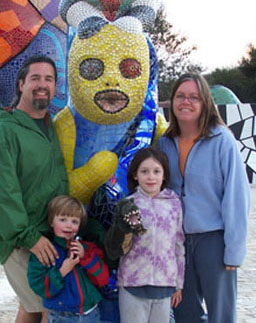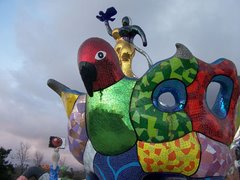Okay, I've always held a vague idea that there is a way to explore mathematics that is really interesting and fun; every once in a while I've read a quote or a snippet from an article that hinted of the magic to be found in exploring mathematical relationships, for example, and it's been on my to-do list for a couple of years to look into it.
Our friend Jill posted a link to this article (click on the link towards the bottom of the page "Lockhart's Lament" for the article) on our homeschooling group last week and I'm absolutely fascinated by what this mathematician/educator has to say. I'm realizing that I've been duped into believing that math is about numbers and calculations, not about spatial relationships, leaps of insight, playfulness and art. I'm not finished with it yet (it's 25 pages long!) but it's challenging all my assumptions about what math is and how it should be experienced! In particular, his explanation on pages 3-5 of how math is an art form rather than a practical application was quite paradigm-shifting for me....
Coincidentally, Steve came across another article in an issue of the New Yorker last week that explores the fact that we now know humans have an innate feel for approximate math and it can get quite complex, but that how we talk about and teach math is very non-innate and hampers our understanding. English is among the languages that does a bad job of communicating math (cantonese, I think is the best, for its simplicity of naming numerals) and while addition and subtraction are intuitive enough, multiplication and division are outside of our hardwiring.
One of the fascinating suggestions both mathematicians raise is this, (the quote is from the New Yorker article):
Our inbuilt ineptness when it comes to more complex mathematical processes has led Dehaene to question why we insist on drilling procedures like long division into our children at all. There is, after all, an alternative: the electronic calculator.
"Give a calculator to a five-year-old, and you will teach him how to make friends with numbers instead of despising them," he has written. By removing the need to spend hundreds of hours memorizing boring procedures, he says, calculators can free children to concentrate on the meaning of these procedures, which is neglected under the educational status
quo."
Lockhart, the author of the 25-page lament, writes in a dialog form that is a nod to Galileo's writings on science and mathematics in which three distinct voices debate (bless you, participants in the world of Wikipedia! I would never have figured out why he was using this construction otherwise!) :
It would be bad enough if the culture were merely ignorant of mathematics, but what is far worse is that people actually think they do know what math is about— and are apparently under the gross misconception that mathematics is somehow useful to society! This is already a huge difference between mathematics and the other arts. Mathematics is viewed by the culture as
some sort of tool for science and technology. Everyone knows that poetry and music are for pure enjoyment and for uplifting and ennobling the human spirit (hence their virtual elimination from the public school curriculum) but no, math is important.
SIMPLICIO: Are you really trying to claim that mathematics offers no useful or practical applications to society?
SALVIATI: Of course not. I’m merely suggesting that just because something happens to have practical consequences, doesn’t mean that’s what it is about. Music can lead armies into battle, but that’s not why people write symphonies. Michelangelo decorated a ceiling, but I’m sure he had loftier things on his mind.
SIMPLICIO: But don’t we need people to learn those useful consequences of math? Don’t we need accountants and carpenters and such?
SALVIATI: How many people actually use any of this “practical math” they supposedly learn in school? Do you think carpenters are out there using trigonometry? How many adults remember how to divide fractions, or solve a quadratic equation? Obviously the current practical training program isn’t working, and for good reason: it is excruciatingly boring, and nobody ever uses it anyway. So why do people think it’s so important? I don’t see how it’s doing society any good to have its members walking around with vague memories of algebraic formulas and geometric diagrams, and clear memories of hating them. It might do some good, though, to show them something beautiful and give them an opportunity to enjoy being creative, flexible, open-minded thinkers— the kind of thing a real mathematical education might provide.
SIMPLICIO: But people need to be able to balance their checkbooks, don’t they?
SALVIATI: I’m sure most people use a calculator for everyday arithmetic. And why not? It’s certainly easier and more reliable. But my point is not just that the current system is so terribly bad, it’s that what it’s missing is so wonderfully good! Mathematics should be taught as art for art’s sake. These mundane “useful” aspects would follow naturally as a trivial by-product. Beethoven could easily write an advertising jingle, but his motivation for learning music was to create something
beautiful.
SIMPLICIO: But not everyone is cut out to be an artist. What about the kids who aren’t “math people?” How would they fit into your scheme?
SALVIATI: If everyone were exposed to mathematics in its natural state, with all the challenging fun and surprises that that entails, I think we would see a dramatic change both in the attitude of students toward mathematics, and in our conception of what it means to be “good at math.” We are losing so many potentially gifted mathematicians— creative, intelligent people who rightly reject what appears to be a meaningless and sterile subject. They are simply too smart to waste their time on such piffle.
SIMPLICIO: But don’t you think that if math class were made more like art class that a lot of kids just wouldn’t learn anything?
SALVIATI: They’re not learning anything now! Better to not have math classes at all than to do what is currently being done. At least some people might have a chance to discover something beautiful on their own.
SIMPLICIO: So you would remove mathematics from the school curriculum?
SALVIATI: The mathematics has already been removed! The only question is what to do with the vapid, hollow shell that remains. Of course I would prefer to replace it with an active and joyful engagement with mathematical ideas.
Much of the rest of his article is a deconstruction of current mathematics education in public school (what I'd really like to read about is how he'd do it right!) But I am fascinated to consider that mathematics may be a far more complex, artful and exciting world that I'd ever conceived of before and I"m looking forward to exploring in a completely new way...
New blog
-
So, made a new blog. Click here if you wanna check it out. Will have more
serious stuff there.
15 years ago





No comments:
Post a Comment